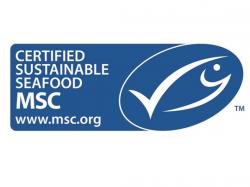Increasing Quantities Of MSC Ecolabeled Products Multiply Sustainable Seafood Options For Consumers
June 5, 2015 | 4 min to read

The commercial sector of the seafood industry has increasingly committed to the Marine Stewardship Council (MSC) certification program for sustainable, wild-caught seafood. Over the past five years, the number of MSC ecolabeled products globally have nearly tripled and continue to increase each year. In North America, supplements, pet food and natural products are among the fastest growing segments of seafood products that are sourced from MSC certified fisheries.
Seafood products with the MSC ecolabel can be found in supermarkets, mass merchant chains, nutritional supplement stores, pet retail, restaurants, universities and other food service establishments across North America. Product categories include: fresh, chilled, pet food, supplements, frozen, pouch and canned food.
The blue MSC ecolabel assures consumers that in every step of the supply chain – from the fishers, to the processor, to the distributor and the end user – MSC certified seafood is not mixed with or substituted for non-certified seafood. It also ensures that seafood bearing the blue MSC ecolabel can be traced back to a fishery that has been certified as sustainable and well-managed against the global, science-based MSC standard.
Look for the blue MSC ecolabel to contribute to the health of the world’s oceans
Consumers can increasingly contribute to the health of the world’s oceans and ensure sustainable seafood for this and future generations by choosing seafood products sourced from MSC certified fisheries. Recently introduced products that bear the blue MSC ecolabel in North America include:
Artisan Bistro Seafood Bowls, the first entrée frozen food line in North America to bear the blue MSC ecolabel
Deck Hand Premium Cat Food, exclusively available at Whole Foods Market
PetSmart National Geographic fish food
Dr. Mercola krill oil supplements
Wiley’s Finest fish oil supplements
Wild Selections albacore tuna, and salmon and herring filets
Crown Prince albacore tuna, yellowfin tuna, and kipper snacks
Pole & Line albacore and skipjack tuna, exclusively available at Whole Foods Market
“By looking for the blue MSC ecolabel and choosing seafood products that are fully traceable to MSC certified fisheries, consumers reward sustainable fishing practices and help to safeguard seafood supplies for future generations,” said Geoff Bolan, MSC’s U.S. Program Director.
Worldwide, more than 27,000 products bear the blue MSC ecolabel, located on in-store, wholesale and foodservice seafood products. Consumer-facing products can be found in more than 95 countries with the estimated annual retail market value of $4.8 billion.
For additional information, visit www.msc.org/product-finder.
Look for the blue @MSCecolabel and celebrate #WorldOceansDay on Monday, June 8, #BlueMonday.
###
About the Marine Stewardship Council (MSC)
The Marine Stewardship Council (MSC) is an international non-profit organization set up to help transform the seafood market to a sustainable basis. The MSC runs the only certification and ecolabeling program for wild-capture fisheries consistent with the ISEAL Code of Good Practice for Setting Social and Environmental Standards and the United Nations Food and Agricultural Organization Guidelines for the Ecolabeling of Fish and Fishery Products from Marine Capture Fisheries. These guidelines are based upon the FAO Code of Conduct for Responsible Fishing and require that credible fishery certification and ecolabeling schemes include:
- Objective, third-party fishery assessment utilizing scientific evidence;
- Transparent processes with built-in stakeholder consultation and objection procedures;
- Standards based on the sustainability of target species, ecosystems and management practices.
The MSC has regional or area offices in London, Washington D.C., Tokyo, Sydney, The Hague, Beijing, Berlin, Cape Town, Copenhagen, Halifax, Paris, Madrid, Stockholm, Santiago, Seattle, Moscow, Salvador, Singapore and Reykjavik.
In total, more than 370 fisheries are engaged in the MSC program with 255 certified and 121 under full assessment. Together, fisheries already certified or in full assessment record annual catches of around 11 million metric tons of seafood. This represents around 12 percent of the annual global harvest of wild capture fisheries. Certified fisheries currently land nearly nine million metric tons of seafood annually – this is close to 10 percent of the total harvest from wild capture fisheries. Worldwide, more than 27,000 seafood products, which can be traced back to the certified sustainable fisheries, bear the blue MSC ecolabel.
Source: Marine Stewardship Council (MSC)
